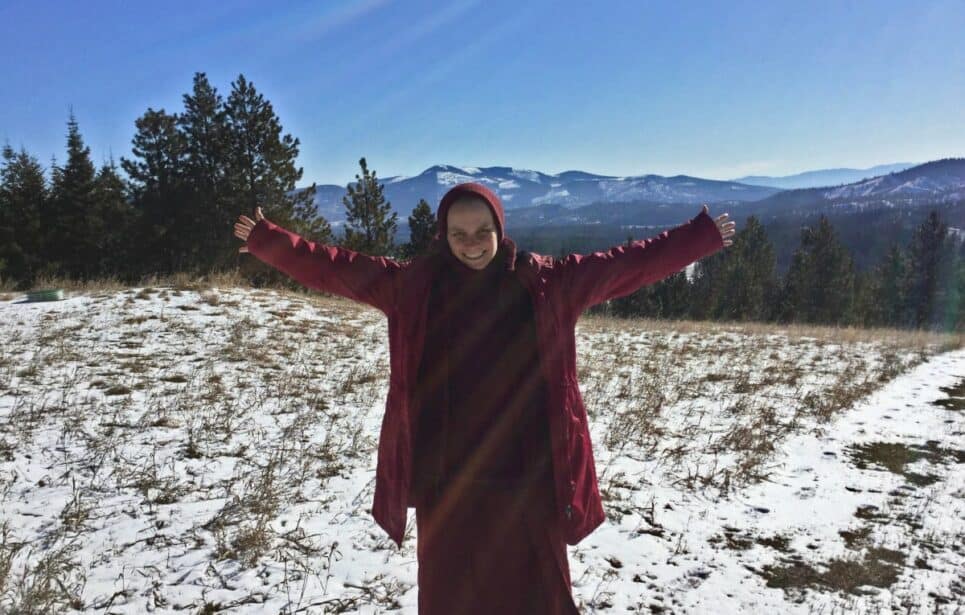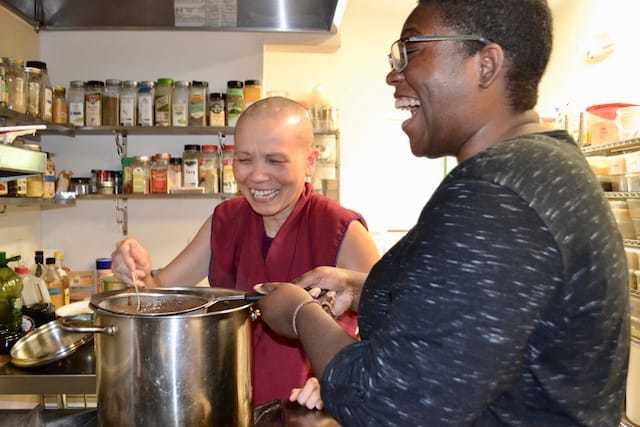Some thoughts on the practice of gratitude

Venerable Thubten Jampa came to the Abbey ten years ago from Germany in order to become a nun and learn the Dharma. She received novice ordination in 2013 and bhikshuni (full) ordination in 2016. Her aim from the beginning was to return to Germany to help the spread of the Dharma and the monastic lifestyle there. She is now living in Hamburg and attending a Buddhist college there. She recently shared the following with the Abbey community.
It is important to be grateful every day. Many religious and native beliefs include gratitude in their daily practices. If we remember gratitude in our daily life we will fulfill the meaning of our lives: to be happy. His Holiness the Dalai Lama often reminds us of this. We become happier by becoming kinder, which is the least we can do in this life—not to harm, but to be of benefit to ourselves and others.
I am very grateful that I could live and train at the Abbey for over 10 years. The Abbey’s culture is such that everything from the blanket at night, the electricity, the morning breakfast, the monastic clothing, the books, the garden tools, the houses, even the property is all due to donation by like-minded people who support our work. Isn’t that enough reason to be grateful? So many people trust in what Venerable Chodron and the Abbey community are doing to benefit sentient beings and are convinced of the Abbey’s abilities to bring peace into this chaotic world.
But even if we don’t live in an Abbey there are still so many opportunities to be grateful. Every day many of us (not all) in the US or Europe have the opportunity to just turn on the water and have clean drinkable water. Or we go to bed at night and have a warm blanket, a roof over our head. There are so many homeless people all around the world. I was shocked seeing so many poor and homeless people in Germany after returning from the US. I am grateful to have a house to live in but I make it to a point to always give food to homeless people; it’s the least I can do.
And, as instructed in the seven-point cause-and-effect instructions we should remember the kindness of all mother sentient beings, beginning with our own mother. This is a practice of gratitude. Many Tibetan teachers urge us to be grateful to our mother and father in this life, even if there may have been difficulties in our relationship. But we are alive, and others have helped us to grow into adulthood. Our mother showed us one of the most powerful types of love by carrying us in her womb and making sure we had all we needed after we were born. Now we are able to stand on our own feet.
If we lose gratitude for our mother we will lose gratitude for all of life. And if we continue practicing the seven-point cause-and-effect instructions to see all sentient beings as our mothers from previous lives and meet them with gratitude, we will naturally come to a point where we wish to repay their kindness. This will certainly contribute to our own happiness because if our mothers are happy, we will be happy too. And since the most our mother wants from us is to be happy and have the causes of happiness, we are going to fulfill our mother’s wishes.
Therefore, to repay our mother’s kindness, we practice having a happy mind by practicing the antidotes to subdue anger, greed, and ignorance. If we want to give thanks to our mothers let’s be happy, thankful, joyful, helpful, and diligent in benefiting them and all sentient beings according to our own capacities.
Bhikshuni Thubten Jampa
Bhikshuni Thubten Jampa is from Hamburg, Germany. She took refuge in 2001. Bhikshuni Jampa studied politics and sociology for 5 years at the Humboldt-University in Berlin and received her master in Social Science in 2004. Afterwards she worked for the International Campaign for Tibet (ICT) in Berlin till 2007 and for the Tibetan Center Hamburg from 2007-2011. She completed monastic training at Sravasti Abbey, USA from 2011-2022. Today she lives in Hamburg again as a fully ordained nun (Bhikshuni) and studies full-time at the Dharma College at the Tibetan Centre. She occasionally offers lectures, retreats, regular meditations and a study group at the Buddhist Society Hamburg and if requested at the Tibetan Centre, among other places. Bhikshuni Thubten Jampa is also involved in the Hamburg Buddhist Society (BGH).


